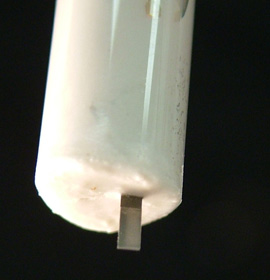A sensor technology that enables measuring samples at the cellular level is now being honed by Drexel University researchers for achieving more quick and precise detection of DNA traces within liquid samples.
 Tiny piezoelectric cantilever sensors, similar to the one pictured here, are being calibrated by Drexel engineers to detect DNA
Tiny piezoelectric cantilever sensors, similar to the one pictured here, are being calibrated by Drexel engineers to detect DNA
Lead researcher at Drexel, Dr. Raj Mutharasan stated that more sensitive and quick DNA testing can be achieved by implementing lead zirconate titanate (PZT) to the existing piezoelectric-excited cantilever sensor technology. This highly-sensitive DNA test will lead to rapid detection of harmful cells and bacteria.
Based on a novel method applicable to a diver movement-related springboard bouncing, the already developed cantilever sensor technology can detect even minute targets. Here, the “board” or cantilever is capable of vibrating at a higher frequency with respect to reduction in mass/weight. In contrast, the cantilever will have decrease vibration frequency with the addition of weight. Calibration of frequency difference of mass-free versus mass-loaded vibrations will enable researchers to precisely detect cells or DNA in samples.
By integrating the PZT material to the cantilever in a modern design, Mutharasan and his team have found a way to activate the “springboard” effect by applying an electric current, thus revolutionizing the previously used classical cantilever method, wherein the flick of the diving board acts as an external stimulus for accelerating the movement of system.
Due to the complete controllable feature of PZT sensors, high-order vibration modes have been detected by the team in certain designs. These vibrations are sensitive to even minute mass changes in liquid samples.
The PZT cantilever device has two-way advantages as it accelerates the process of DNA replication within a sample. Simultaneous amplification and detection of DNA at room temperature will be performed by the researchers within a short time frame. Cantilever sensor enables unwinding of double-stranded DNA by vibrating the sensor at the right frequency.
The research team recently received grants from NSF, through which they will progress this research involving piezoelectric vibrations-based simultaneous DNA replication and detection. By applying mechanical energy to sensor surface through PZT, the researchers intend to melt the DNA for replication.
PZT sensors are found to be capable of testing samples in liquids at room temperature. Using PZT sensor, DNA indicators for prostate cancer have been detected in urine samples, in addition to other medical detection applications. The technology will however be commercially available in two to three years following certain upgrades.